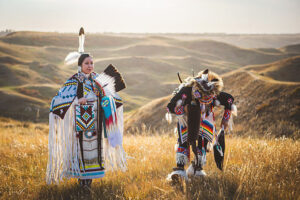LC launches Indigenous education strategy
By Lethbridge Herald on March 18, 2021.
 Submitted Photo
Lethbridge College alumni Torry Eagle Speaker (left) and student Punky Daniels (right) dance on the coulees at Lethbridge College. Lethbridge College formally launched its long-awaited “Coming Together in a Holistic Way,” Niitsitapi Strategy on Thursday.
Submitted Photo
Lethbridge College alumni Torry Eagle Speaker (left) and student Punky Daniels (right) dance on the coulees at Lethbridge College. Lethbridge College formally launched its long-awaited “Coming Together in a Holistic Way,” Niitsitapi Strategy on Thursday.Tim Kalinowski
Lethbridge Herald
tkalinowski@lethbridgeherald.com
Lethbridge College launched its long-awaited ‘Coming Together in a Holistic Way,’ Niitsitapi Strategy with much fanfare and celebration on Thursday.
“We have committed to making Indigenous education a priority, to establishing Indigenous-centred, holistic support services, and building relationships with our Indigenous communities,” said Lethbridge College president and CEO Paula Burns.
“This strategy of ours will help to guide us in our work going forward, and to allow us to strive and meet the outcomes that are contained within. I recognize achieving our college’s vision of leading and transforming education in Alberta is only possible when we truly engage and take action. So it is the responsibility of every employee to do their part in working toward the outcomes and the strategy, and I urge you all to spend time with it, and see the ways you can be involved. What will your story be?”
“Today was a momentous occasion for Lethbridge College,” said Lethbridge College Manager of Indigenous Services Shanda Webber. “This is about making Indigenous education a priority at Lethbridge College. Our hope for the strategy is everyone at Lethbridge College, and even in the wider community, has a role to play with moving the strategy forward.”
The comprehensive strategy will seek to incorporate Blackfoot traditional knowledge and Indigenous awareness at every level of college life both within the corporate workings and the classroom.
Despite being delayed in its implementation for a year due to COVID-19, Webber, who was one of the architects of the strategy, said she felt the extra year had allowed her and others to really hone in on the key elements of the holistic vision put forth by the Niitsitapi Strategy.
“Our hope for the future is we can continue to have those honest conversations,” she said.
“We can move forward in a good way to start to infuse Indigenous content into the curriculum, and we can ask questions we hopefully don’t feel uncomfortable in asking them. At the end of the day, we are all human beings, and if we can learn Indigenous and non-Indigenous alike this strategy is going to show the powerful and great things we can do when we work together.”
The strategy will also, she hoped, lead to more Indigenous students enrolling for and completing their education at Lethbridge College.
“When I talked to one of our Elders, Peter (Weasel Moccasin),” she said, “I asked about education being our new buffalo, and specifically for the Blackfoot people the buffalo was their sustenance in the past. They used every part of that buffalo to live and to thrive. Since the buffalo or bison haven’t been here for many years, education is that new buffalo in the sense they receive that education, they get that certificate, or get that diploma, which allows them to then go into the workforce or bring that education back to the community to do better for their community.”
Lethbridge College 2018 graduate Chelsea Low Horn Day Rider was one of the keynote speakers at the launch event for the Niitsitapi Strategy on Thursday. She felt the new initiative could only improve on the supports already available for Indigenous students on campus, which were already key to her success in completing her own education. She spoke about the personal and health trials she faced in the second year of her three-year program which almost led her to drop out.
Low Horn Day Rider said without the support of the Elders on campus who consoled her in her grief and gave her courage to face her own health issues she would not have made it to graduation.
“They brought me comfort in my time of need when I really needed it,” she said, before relating a touching story of handmade moccasins made by her grandmother and passed down to her by her mother. Each day they reminded her of who she was as an Indigenous woman, and of the love and support she could draw from her family and her traditions.
“I always carried my moccasins with me every day (on campus),” she said. “I always packed them with me every day because they gave me the strength I need.”
For more information on the Niitsitapi Strategy view at https://www.youtube.com/watch?v=0Yf_byUVVUU
Follow @TimKalHerald on Twitter
-1




